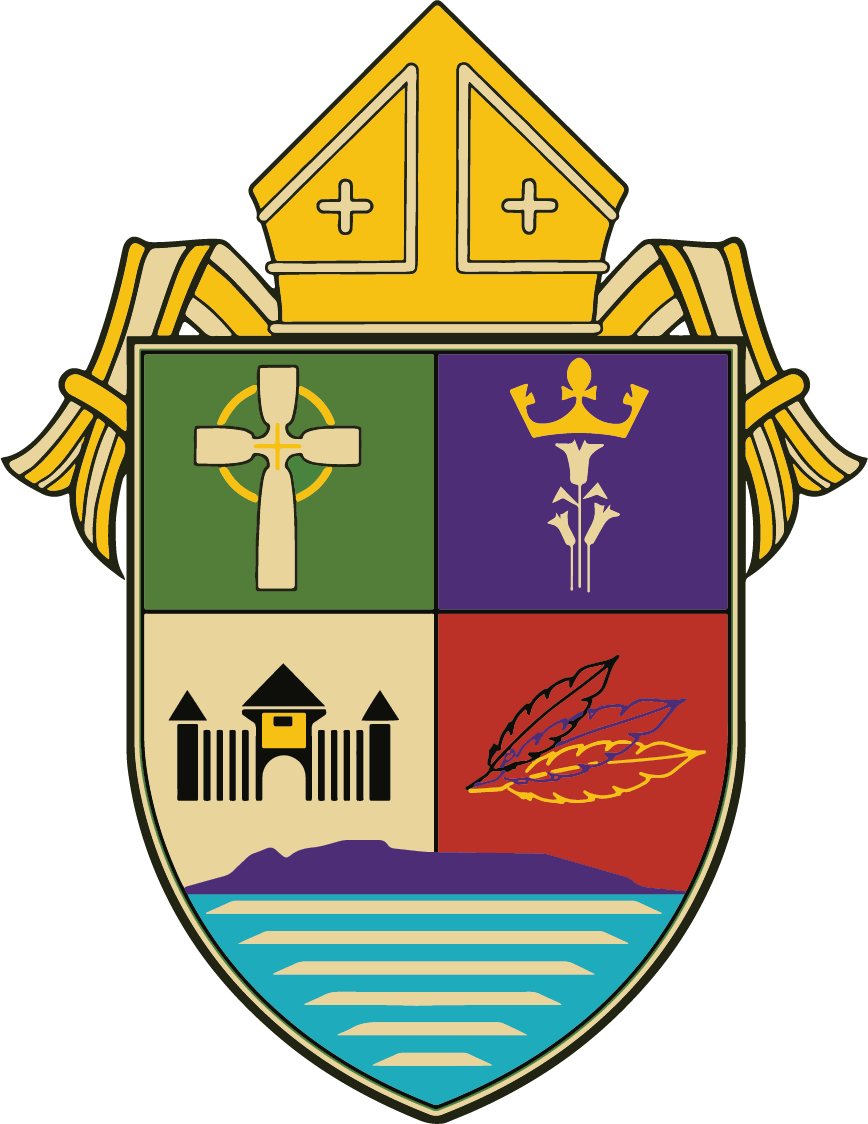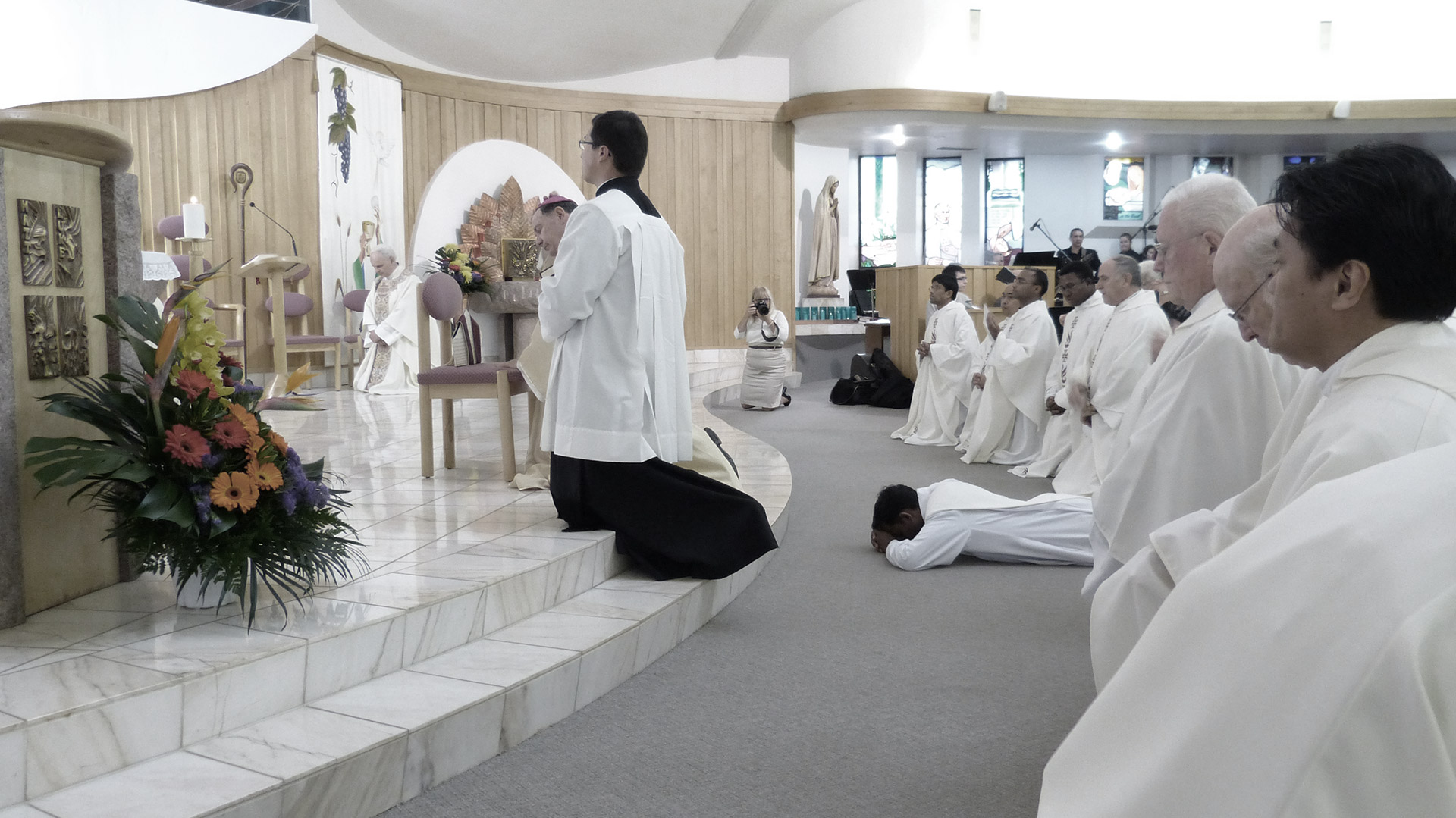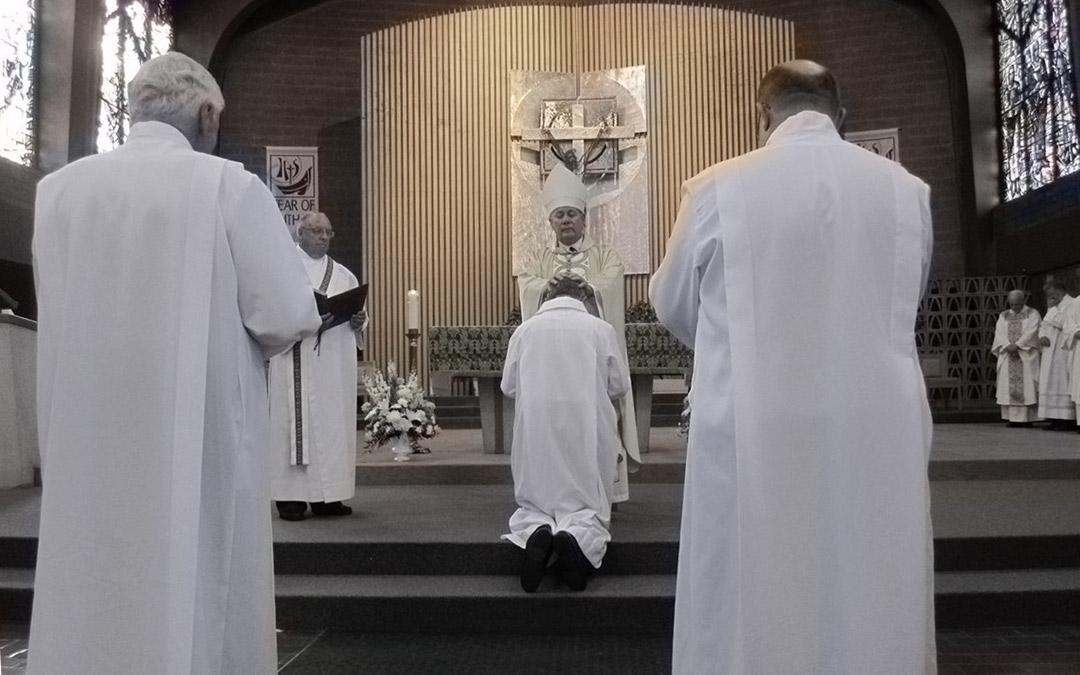Religious Vocations
Vocations Office

Fr. Mike Mahoney is Vocations Director for the Diocese of Thunder Bay. If you feel called to the Diocesan priesthood or simply want to talk about vocations in the Catholic church, please contact him:
Fr. Michael Mahoney
St. Dominic's Parish
130 Redwood Ave West
Thunder Bay, ON, P7C1Z4
Tel: (807) 577-5672
Email: Fr. Mike
God's Call
Being "called" is a very mysterious reality. Often when someone is called, they do not realize it or accept it for some time. This is especially true if your "call" is a religious call! We may begin to ask ourselves the questions: Who's calling? How do I answer? Then again we may want to say: Stop calling! I'm too busy to take "calls" right now!
Each day in the community where I live we pray for Vocations. Today, when we speak of "call" or "vocation", we often mean priesthood or religious life. But, what about the majority of people we know? Are they called? Do they have vocations?
Vatican II reminds us that by our baptism all Christians have a fundamental call to holiness. All of us are invited into a very special friendship by God. How we live out that special relationship with God is as unique and different as we are!
How do we know what we are called to be? How do we know if we are called to a religious vocation? The key, of course, begins with self-understanding, prayer, and a willingness to allow ourselves to ask the questions. We often need to have other people share in the discernment process. A good spiritual director is a necessary element of any vocation discernment! So often we feel that we are the only ones who have these types of questions or feelings. We may feel we are the only one in the whole world who has been called! Of course the opposite is true.
Therefore, we cannot go through the discernment process on our own. We need to talk to those special people who know us well and speak to us honestly and directly. We may also need to hear the experiences of others and find strength in the shared pursuit of this mystery.
Go to the Scriptures to see how God has acted in the past. The prophets and the apostles all had different responses to their individual "call". The enthusiasm with which they responded to God's call varied. Some were willing to give up everything. Others did not want to respond at all! Knowing how God acted in the past can help us to understand how God may be acting in our life right now!
We often hear: "God's ways are not our ways". Certainly in the lives and events of Scripture this seems to be the case. From a human standpoint, God seems to act so illogically especially when calling individuals to accomplish some task. Our culture and "business" orientated approach to vocational discernment usually encourages us to try and find the most qualified person for the job. We seek the most experienced, the best educated, the most gifted! Yet, look who God chose! Moses, Sarah, David, Jeremiah, Mary, the apostles, and many others - people seemingly limited because of age or lack of skill but human beings in tune with the reality of God's presence in their lives.
Do we at times put ourselves down because we feel that we are not worthy enough? Or good enough? Or talented enough? Do we put ourselves down because we are not perfect? Do we rule out the possibility of a religious vocation because we are all too aware of our "humanness"? If so, we may be overlooking the very gift that God has given us to serve the Church.
For some tragic reason we may be too blind to see the unique gift we can bring to religious life. "Come, follow me," Jesus said to the apostles.
To us, this may sound very vague and unclear. Most of us want clarity. We want a job description before we say yes! We want to know our benefits. We want to know what is expected of us. Yet, when we receive the call, Jesus simply says, "Come, follow me".
Our need for control and certainty can prevent us from responding to the invitation of Jesus. Our concerns and anxieties about the future can often be paralyzing and can minimize our freedom of choice. And yet the questions remain - am I motivated by my faith or controlled by my fears? What is it that is getting in the way of my response to God? Why do I feel so unfree at times? Unable to move forward?
Again experience in the Scriptures can assist us. While God's action in our lives may seem illogical and vague, God's call or invitation is never in the abstract. God calls each of us personally, by name. And God called in the present. These two realities can help us as we try to determine our best response to God's invitation.
Since God calls us by name, our response can only be from the unique individuals that we are. We respond with our own talents and abilities, our own shortcomings and limitations. As Peter was different from Paul and Mary from Martha, so each of us is different and so is our response. We respond to God in a way that is not better or worse than others just uniquely different.
God calls us always in the present. Jesus called his followers at a particular moment in history. They answered accordingly, out of their culture and time frame, out of a whole series of relationships. Today's disciples are no different. The circumstances and people in our lives help to clarify our response to God. We live in the 20th century with uniquely rich backgrounds and special human relationships.
Being attentive to our experience will provide the clarity we need. God's call is mysterious and unclear. Knowledge of ourselves, acceptance of our strengths and weaknesses, and self awareness are crucial in helping us respond. But it is the realization that God is present NOW inviting each of us to a deeper friendship that is the source of this call. It is the promise of Jesus, "I will be with you always" that makes our response possible.
The Discernment Process
Do I feel called to a religious vocation? Am I called to serve the Church in some other way? What does God want from me in my life? These are difficult questions to answer. The discernment process is often a long and difficult road to travel. A candidate discerning a vocation to priesthood can have many questions and few answers.
At times, because of all the options, a candidate may feel it is too difficult to make a decision. Therefore, they make no decision. It is helpful to "process" all the options one may face. We often find it difficult to make a decision because we are too caught up with how we "feel" about our options. One may appear easier. Another may not be considered because it never crossed our mind!
It is often the case that we are more controlled by our feelings than we are by our cognitive thoughts. In other words, our heart gets in the way of our mind. In order to make good decisions, we must involve both our heart and mind. I would like to share a process that has been helpful for me when I had to make difficult decisions in my life.
It is a process that can help us to "think" about our options in an objective way. I believe it is a process that can bring some clarity for a person who may be discerning a Religious Vocation. The first step is to get a piece of paper and write down the decision that has to be made. If we are discerning a call to Priesthood or Religious Life, the decision is to pursue this call. Second, write down the decision not to be made - i.e. Not pursuing Religious Life or Priesthood. Then, make two columns for each decision. Write down the pros and cons for both decisions. Write down as many that you can think that are honest and true.
After this is done, evaluate the weight of those decisions you have written down. Are both decisions about choosing something good? Does one weigh more heavily than the other? Are there more reasons to make one decision than the other?
Next, choose one of the decisions! This is perhaps the most difficult part since we often feel we may be leaving something out. Yet, if we fail to make decisions in our lives, we fail to grow. Once the decision is made, live with it for a week. It is not good to act or make decisions quickly. Talk about your decision with friends. Listen to your feelings, thoughts and dreams.
Then, "wear" the other decision for a week! What are your feelings now? How has your prayer been during the week? Do you feel comfortable with this decision? Always remember that vocations come from God. Therefore it is important throughout the process to pray. Reading scripture, spending time listening to God in prayer are extremely important. Finally, make a choice and live with it. Follow up on your decision by taking whatever steps are necessary to pursue it.
Making decisions is not easy, but when they are made the right way, they can be very liberating. As you go through the discernment process in regards to Religious Life, know that God is with you! Pray for God's guidance and the wisdom that is needed to make the right decision!
A Discernment Process
- Write down the decision to be made.
- Write down the decision not to be made.
- Make two columns for each decision. Write down the pros and cons for both decisions.
- Evaluate the weight of those things you have written down. Are both decisions about choosing something good? Does one weigh more heavily than the other?
- Choose one of the decisions. Live with it for a week. Talk to friends about it, listen to your own feelings, thoughts, dreams, sleeping and waking patterns.
- Wear the other decisions for a week. What are your feelings now? How has your prayer been during this week?
- Make a choice. Live with the decision.
Spiritual Direction & Vocational Discernment
Many people consult a spiritual director to help them attain a degree of objectivity regarding their spiritual lives. Doing our own will is usually what harms us. And they shouldn't seek another of their own making, as they say - one who is so circumspect about everything; but seek out someone who is free from illusion about the things of the world. For in order to know ourselves, it helps a great deal to speak with someone who already knows the world for what it is.
As vocation director, I have come into contact with many men who are considering the possibility of a religious vocation to priesthood. My advice to them is always the same - look for a spiritual director who can help in their vocational discernment. It is my belief that spiritual direction is not only necessary but essential for those considering a church vocation. In this article I will attempt to give a brief description of what is involved in spiritual direction. I will then share some thoughts as to why and how spiritual direction can be helpful in vocational discernment.
Spiritual Direction: What is it?
Spiritual direction is counselling which helps us grow in our relationship with God through prayer. It helps us deepen their relationship with God. The "spiritual" help provided by a spiritual director helps the person in direction to become more open to the prompting of the Spirit in the ordinary events of their lives. Spiritual direction invites them to grow, calls them to conversion and toward a deeper relationship with God and others.
Spiritual direction entails many things. One of the tasks of the director is to help the person discern the presence and action of God in their lives. A basic assumption is that God communicates to us as individuals. It is this self-revelation of God that is the basis of our own personal values, our direction in life and our uniqueness. In spiritual direction, the director helps to facilitate a process whereby the person can examine the origin and direction of God in their lives which is often ambiguous and ambivalent. We may think we know where God is leading us and how God communicates. But, as we grow, we change. This change necessitates a constant reevaluation of the judgments, decisions and actions we may have taken in our life. This does not mean that our choices in life change. It simply means that we need to constantly be about the business of discernment so that we can keep in contact with God's revelation to us.
Vocation involves our choice of occupation in life. Yet, it is more than just "work." It is our response to God's call. A "vocation" is a gradual revelation - of me to myself by God. This choice of occupation becomes a vocation when we are open to continual communication with God about our life's direction and God's needs. The "call" of God is the invitation to choose that occupation that will be most in line with our ever-growing sense of God's will.
Discernment is the art of listening to our inner selves and learning to recognize (discern) movements that rise from the Holy Spirit. The dictionary defines the verb "discern" as "distinguishing with the eye or the mind." The healthy eye can distinguish between the colours red and green. Healthy minds can distinguish between good and evil.
To discern also implies the ability to detect something that is not immediately obvious. It implies looking at something in a clear way, in a way that involves our mind, heart and soul. A wise spiritual director can detect the stirring of a genuine vocation hidden beneath the confused emotions of a young adult.
In vocational discernment, two things need to be discerned - the underlying motivations, values, feelings and thoughts that go into making a decision and the practical choice to do God's will in our lives. In the first we discern whether or not the above-mentioned aspects of our personality are under the influence of the Spirit.
The second involves understanding God's will for us in our lives. Central to discernment of a vocation to priesthood is our Catholic theology of "call." Being "called" is a mysterious reality. Most times, when someone is called, they do not realize it or accept it for some time. They make excuses! Scripture is filled with stories of prophets and disciples being called. It also gives some of their excuses!
The prophets and apostles all had different responses to their individual "call." The enthusiasm with which they responded to God's call varied. Some were willing to give up everything. Others did not want to respond at all. Knowing how God acted in the past can help is to understand how God may be acting in our life right now!
The tradition of God calling forth members of the community to serve in certain ways is so deeply a part of our Christian and Catholic tradition that it seems to suggest that our "vocation" or "call" is the reason why we do ministry. When asked: Why are you a minister? Why are you a sister, brother or priest, one often hears the response: "Because God called me." Yet, most ministers would readily admit that their "call" did not come in a form similar to those in scripture. In fact each of our "calls," like those of the prophets and disciples in scripture, are unique.
I became a priest because I discovered that God's call to me was more of a background whisper, a realization that in the ordinary events of my life, God was acting and guiding me. God was calling me and continues to do so! When one feels "called" by God to be a religious, one should not take the call lightly. A person must reflect upon this call by looking at the "patterns" in their lives and their relationship with God.
Thus, spiritual direction is necessary. Spiritual direction is helpful because it is God who calls. And, as stated above, the primary focus of spiritual direction is on a person's relationship with God. Genuine spiritual direction helps a person in becoming more open to the prompting of the Spirit in the ordinary events of life.
Spiritual direction helps to discern God's communication to us because we relate to God as we relate to all others. We bring our personality into this relationship with all its faults and all its pathologies. Like all our other relationships, we at times tend not to be objective. We may be possessive, domineering or even blind in our relationship with God. Our view of events that happen to us and the difficulties in our relationships often can be one-sided.
Spiritual direction offers objectivity in our relationship with God. A good spiritual director cannot only help us to understand God's self revelation but can also help us to understand how we relate to God.There are some specific responsibilities that a Spiritual Director has when dealing with a person who is in the midst of vocational discernment. When a person begins to define or rethink their vocation, the director-directee relationship is of invaluable assistance.
Spiritual directors assist a person in discernment by helping them form the right question. Frequently an individual is often faced with two "selves" as they enter young adulthood. The first "self" is the true child of God gradually emerging in a person's life under the influence of grace. The other self is the egocentric self which can be very devout but which ultimately relates everything, even the divine will, to its own preferences. A spiritual director can help facilitate the process whereby the first self grows and the other self decreases.
In this way, the primary question becomes: "How is the Lord calling me to serve God and God's people?" Rather than, "What do I want to do with my life." As simple as this may seem, this question is often overlooked or pushed aside because our own personal desires engulf our mind. Candidates consider priesthood for many reasons. Their motivations often vary. One primary task of the spiritual director is to sift out and sort out impulses, attractions, fantasies and desires. Spiritual direction helps us separate what comes from God and what originates from other sources and possibly lead us away from the will of God. Let me explain.
Some candidates that I have met considered priesthood because of the job security it offered. Let's face it. Priesthood is one of the few professions where you are pretty much guaranteed three squares a day and a bed! My sister said to me on my last visit home that I am the only one in the family who does not have to worry about being laid off! In a society where there is high unemployment, lack of job security and uncertainty about the future, candidates may see a certain amount of stability in priesthood that is quite attractive.
The stability priesthood offers can be quite attractive to a candidate who has found it difficult to find meaningful employment or to even hold a job. Yet, any veteran priest can tell you that one should not be motivated by the stability priesthood may offer since the Church does change and a lack of consistency in one's life before entering priesthood is not a good sign. Therefore we constantly need to be about the business of discovering God's will for us which I believe remains consistent even though what we do may change.
So, our vocational choice, whether it is to the single, married, priesthood or vowed life must be much more than a response to what we want to do in our life. It must be in response to what God wants us to do in our life! The true vocational choice, the one that will ultimately last for a lifetime is the one that God calls us to! Our vocational choice, if it is going to persevere, must be first a response to a call that we feel and experience deep within our hearts from God.
Our vocation choice cannot be a response to our search for security and meaning in our life. It cannot be a response to a mere attraction or a desire that we have for ourselves. It must be a response to a call from God. If it is not, our vocation stands little chance of persevering.
Whatever the underlying desire is, the task of the spiritual director is to help the directee focus on their desires since they can effect our vocational choice. The task of the spiritual director is to look at the underlying desires and to help the candidate answer the question: How is the Lord calling me to serve God and God's people?
How is this done? An essential element of the relationship between the director and directee is trust. A directee needs to feel secure enough to share his or her desires and to have them questioned. The spiritual director must listen. They listen to the working of God within the discerning person. When appropriate, in an atmosphere of trust, they offer observations. They question. They may even at times offer suggestions.
A spiritual director needs to be able to identify the potential within a directee in vocational discernment and invite this potential to be actualised. The call of Simon to be Peter is instructive! Jesus saw something in Peter that he did not see in himself! A good spiritual director needs to challenge, to probe and call forth the talents and gifts of the individual. Are these gifts in line with their vocational choice?
Another responsibility of the spiritual director is to help the directee see and understand the ramifications of their vocational choice. They need to explain the basic principles of vocational discernment and the choice they are considering to the one making the choice. Spiritual directors can help the directee see how their life will change if they follow one path over another. Our vocational choice always effects our lifestyle and ministry.
Making the right choice in life involves an understanding of these "effects" and an ability to live them out. A spiritual director helps the directee to look at their life and ascertain whether or not the candidate has the ability to live out their vocational choice.
For this reason a spiritual director who is working with a person who is considering the possibility of religious life must bring up the subject of celibacy if it does not come up naturally. After all, a healthy living of the celibate life is the expectation for a religious! A spiritual director needs to ascertain whether or not the directee has a good understanding of celibacy and is capable of living the celibate life. What is their background? Their sexual history? How long have they lived the celibate life?
These I think are relevant questions that need to be explored if one is working with a directee in spiritual direction that is considering religious life. Is a directee considering religious life comfortable living in community? Do they have a healthy understanding of obedience? Is financial gain a primary motivation? Are they willing to let go of their desire to raise a family, to have children? These questions point us to a final responsibility of the spiritual director.
A spiritual director must ascertain whether or not the directee is mature enough or developed enough to make a lifelong commitment in their life. Young vocation prospects at times must be encouraged to wait out the process of emerging vocational consciousness. God may call us at a very young age. Yet, it is not until a person experiences their personal call from God as a mature person that a lifelong decision be made.
A vocation is always a response to some action, mission or task. It is not simply taking on a role or recognising that God called. It is a response that requires a life dedicated to being a part of God's plan for creation.
Discerning a vocation to religious life is no easy task. In fact it is a lifelong process. It is over our lifetime that we gradually learn the shape of our life. It requires of us that we be in constant communication with God. For, fidelity to a vocational choice is not just an act of memory, a thing of the past. It is the decision we make each day of our lives to remain in conversation with God. Vocations fail not when earlier visions undergo change, but when we can no longer imagine that God is about something in our lives.
Excuses! Excuses!
For many years, I have acted in the capacity as a Vocation Director for the Roman Catholic Church. During this time, I have been in contact with many people who have been considering the possibility of being a Roman Catholic priest.
Inevitably, somewhere along the line, all the candidates come up with good reasons why they should not pursue their vocation or call to religious life! Fears set in, doubts set in and there is always something that is holding them back.
Sometimes, the reasons candidates decide not to act on a religious vocation at the present time are good and certainly need to be considered. There may be family concerns (elderly parent), financial debts to pay off, a strong desire to finish schooling or training in a particular field. When these reasons surface, they need to be considered and sometimes may require that a candidate's personal plans or consideration of religious life be put on a "back burner" for a while.
Yet, sometimes, they may be just "excuses"! Excuses that are "self" centred are sometimes not God orientated. Excuses that flow from some fear I may have of responding to a call from God may be real but not worth considering. When do we know if our reasons for not considering a call from God are good reasons or just excuses?
Where can we get help? Well, a good spiritual director can help with this. Often times, we need to seek the guidance of others who may be better able to help us make this distinction. One important point to remember is that there is probably no "excuse" that has not been used before!
All the "excuses' we can think of probably were thought of and used before. God has heard them all! If you don't believe me, check out scripture!
If you can identify with one of the popular excuses listed below; take a moment to investigate the Lord's input to your concern (after all, God is the one calling). Although it is not David Letterman's, these can be seen as the Vocation Director's "Top Ten List" of excuses given for not considering the possibility of being a religious. So, in descending order, the top ten list of excuses given for not entering religious life is...
#10. "I want to be happy." Check out: Psalm 37:4; Matthew 5:1-12; John 10:10 and Mark 10:28-31.
#9. "I'm afraid of being alone." Check out: Exodus 3:4-22, Luke 1:28-38 and Matthew 28:20.
#8. "I'm not smart enough." Check out: 2 Corinthians 4:7-18 and Exodus 4:10-17.
#7. "I am afraid of making a commitment." Check out: Ruth 1:15-17 and 1 Corinthians 25:5-10.
#6. "I want the good life." Check out: Mark 10:17-31, John 10:10 and Matthew 13:44-46.
#5. "I want to have a family" Check out: Genesis 12:1-3, Matthew 12:46-50 and Mark 10:28-31.
#4. "I'm not talented enough." Check out: Luke 1:26-38.
#3. "I've made mistakes; I'm a sinner." Check out: John 21:15-23, Matthew 9:9-13, Luke 7:36-50.
#2. "I am afraid I will fail." Check out: Exodus 14: 10-31 and Luke 15.
And, the top excuse given for not considering the possibility of religious life is...
#1. "I am not holy enough." Check out: Isaiah 6:1-9 and Luke 5:1-11.
Although put in a humorous way, these "excuses" are real. They can be paralysing. They can make it impossible for us to go on with our life. They need to be reconciled. You can take comfort in the fact that they arise in the hearts and souls of everyone who considers a religious vocation. You are not alone.
What do we do if we discover that they are not good reasons but just "excuses" for not considering religious life? Well, perhaps the prophets, disciples and followers of Christ who had these same excuses can give us some direction. It is clear that all of them had to put their "self" aside and trust in God. Moses had to do it. Mary had to do it. All the apostles had to do it. God wants us to be happy in our lives. Happiness comes from trusting in God. Perhaps we need to do it.



